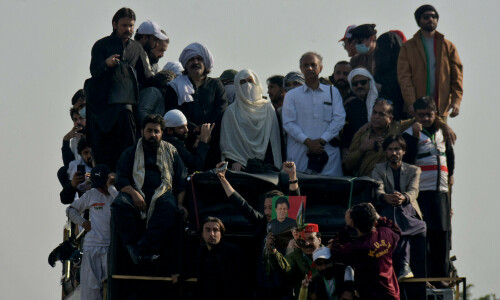NEW DELHI, July 29: President Gen Pervez Musharraf has overcome a major domestic crisis and India finds in him a credible interlocutor for peace talks that are on course, though a bit slow, India’s National Security Adviser M.K. Narayanan has said.
In an interview shown on Sunday, Mr Naryanan told CNBC TV channel that there had been no ‘major dent’ in Gen Mushsrraf’s influence as he had managed to ‘rectify’ the situation by accepting ‘with grace’ the reinstatement of Chief Justice Iftikhar Chaudhry.
Mr Narayanan said he believed Gen Musharraf would be President of Pakistan in January 2008 although he was less sure whether he would also be the army chief. He also discounted the possibility of a major upheaval in Pakistan, observing that terror was a threat to personalities, not to the regime. “These days terrorist incidents have become common across the globe and I don’t think terrorist incidents create a major upheaval.”
The “worst is over” for Gen Musharraf as he has won international acclaim for his handling of the Lal Masjid crisis. “Hardly any of the clerics have backed the Lal Masjid duo. Even the jihadis, except for a small fringe, have not come out (against Musharraf). To that extent President Musharraf can sit back and feel the worst is over ... I think the terror is a threat to personalities but I don’t know whether it is a threat to the regime,” Mr Narayanan said.
Mr Narayanan said he also believed that Gen Musharraf would not declare an emergency and would prefer to be elected by the present assemblies.
‘'India could do business with him. We have no doubts on that. Having said that, if President Musharraf is succeeded by X or Y we are prepared to (do) business with him,” he added.
“I personally don’t think that there has been a major dent in President Musharraf’s influence,” Mr Narayanan said in his assessment
of the Pakistani leader’s hold on power in the wake of the Supreme Court verdict, the Lal Masjid crisis, a spate of terrorist attacks and moves by opposition parties to come together.
He said the peace process with Pakistan had neither been stalled nor kept in abeyance. “There is some progress… Progress has always been slow, it’s incremental but it has not stopped... We could always argue it could go faster,” he said.
Mr Narayanan also spoke about Al Qaeda’s threat in India but denied that the attempted bombing in Glasgow indicated any link with Indian Muslims in a wider sense.
“My impression is there is no Indian Muslim in one of these camps. Sometimes an odd individual might be instigated to do something... I think the Indian Muslim is far more integrated than the immigrant Muslim in UK or elsewhere,” Mr Narayanan said.
Al Qaeda, he said, was looking for more recruits across the globe and would like to “punch a hole” as far as the Indian Muslim community was concerned. “We know that on a couple of occasions they have done a recce and gone back. They have not yet done something,” he said.
About concerns expressed by Indian Army Chief Gen J.J. Singh on cross-border infiltration, he said there was a spurt in April. “It has come down appreciably.”
“I think the number (of jihadi units coming) by sea or by Bangladesh and Nepal are in some ways bigger than what happens across the LoC from time to time,” he said.
On whether the anti-terror mechanism, which has only met once in March this year, was a non-starter, Mr Narayanan said he expected useful progress at the second or third meeting. “When we decided to set it up, we were quite sure it wasn’t going to get off to a galloping start. The start has been slow, but I think the sort of volatility we are now seeing in Pakistan will encourage them (to cooperate).”














































Dear visitor, the comments section is undergoing an overhaul and will return soon.